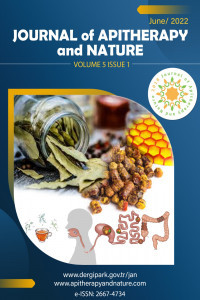Can Propolis Inhibit Infection Dynamics of Honey Bee (Apis mellifera L.) Viruses in vitro?
Can Propolis Inhibit Infection Dynamics of Honey Bee (Apis mellifera L.) Viruses in vitro?
___
- .
- Yayın Aralığı: Yılda 2 Sayı
- Başlangıç: 2018
- Yayıncı: Oktay YILDIZ
Quantitative and Qualitative Variations in Propolis Collection
C. TANANAKI, A. THRASYVOULOU, D. KANELIS, V. LIOLIOS
An Overview of Chemical Studies and Biological Activities of Mediterranean Propolis
Konstantia GRAIKOU, İoanna CHINOU
Preliminary Evaluation of the Cytotoxic Potential of North-West Romanian Propolis
Constantin İ. MATES, Emoke PALL, Marina SPINU, Laura STAN, Mihaela NICULAE
Carmen Violeta POPESCU, Hazem ABBAS, Stefan MANEA, Lili IVOPOL, Alina DUNE, Candice POPINIUC, Dumitru LUPULEASA
Propolis: Pharmacological Properties and Medical Applications of Propolis in Modern Medicine
Cytotoxic Activity of Four Propolis Colombian Samples Against Canine Osteosarcoma Cells
Dolly Patricia Pardo MORA, Oscar Julián MURILLO, Mauricio Rey BUITRAGO, Mónica LOSADA, Jaime Fabian Cruz URIBE, Karina Basso SANTIAGO, Bruno José CONTI, José Maurício SFORCIN
María İnmaculada GONZÁLEZ-MARTÍN, Eddy Valentín BETANCES-SALCEDO, İsabel REVILLA, Ana María VIVAR-QUINTANA
Caseinates Loaded with Red Propolis Extract
İsabel Cristina Celerino De Moraes PORTO, Clinston Paulino De ALMEIDA, Nataly Miranda Do NASCIMENTO, Amanda Barbosa WANDERLEY, João V. Lessa De OLIVEIRA, Felipe J. L. Barbosa Dos SANTOS, Valdemir Da Costa SILVA, İrinaldo Diniz BASÍLIO-JÚNIOR, Giselda Macena LIRA, Marta Maria Da CONCEIÇÃO, Ana Flávia
Can Propolis Inhibit Infection Dynamics of Honey Bee (Apis mellifera L.) Viruses in vitro?
Portuguese Propolis: A Source of Valuable Bioactivities
A CUNHA, H ALVES, C ARAÚJO, L BARROSO, M CRUZ, As FREİTAS, Aj GOMES, R GONÇALVES, R MARQUES, B MOREİRA, C PASSÃO, M PEİXOTO, H PEREİRA, R SİLVA-CARVALHO, İ VALENÇA, Am FERREİRA, F BALTAZAR, F PİNTO-RİBEİRO, S CARDOSO, R OLİVEİRA, C ALMEİDA-AGUİAR
